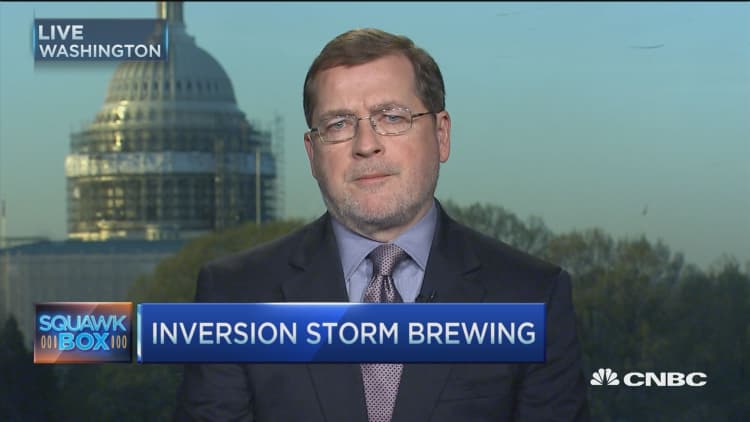
The only way to stop U.S. enterprises from fleeing abroad is for Washington to reform corporate tax laws to make American companies more competitive, anti-tax crusader Grover Norquist said Wednesday.
The founder of Americans for Americans for Tax Reform said President Barrack Obama and Senate Minority Leader Harry Reid have blocked tax reform because Republicans have not been willing to agree to tax increases.
"Good ideas that everybody agrees on in Washington, D.C., are not known as passed legislation. They're known as hostages," Norquist told CNBC's "Squawk Box."
"He's been holding tax reform hostage," he said.
On Wednesday, Pfizer and Allergan announced they would abandon a $160 billion merger after the U.S. Treasury Department announced new rules to curb so-called inversions, or deals in which American companies buy a foreign firm in order to shift their business to a more attractive tax domicile.
Fortune 500 companies keep a total of $2.1 trillion in profits overseas for tax purposes, according to a study by U.S. PIRG Education Fund and Citizens for Tax Justice released last year.
The United States has the highest top marginal corporate tax rate — about 39 percent — among developed nations. The 34 nations in the Organization for Economic Co-operation and Development average a 25 percent rate, according to the Tax Foundation.
Steve Case, co-founder and former CEO of AOL, told CNBC that inversions were a symptom of a wider problem.
"The real issue is how do you take a fresh look at the tax code and create the right incentives for investment, particularly in young, high-growth start-ups, which would create the jobs and drive growth," he told "Squawk Box."
Both Republicans and Democrats have taken "harsh" positions and have only been able to tweak taxes around the edges, Case said.
The issue will only become more complicated during the next wave of innovation, which he said is becoming increasingly globalized.



